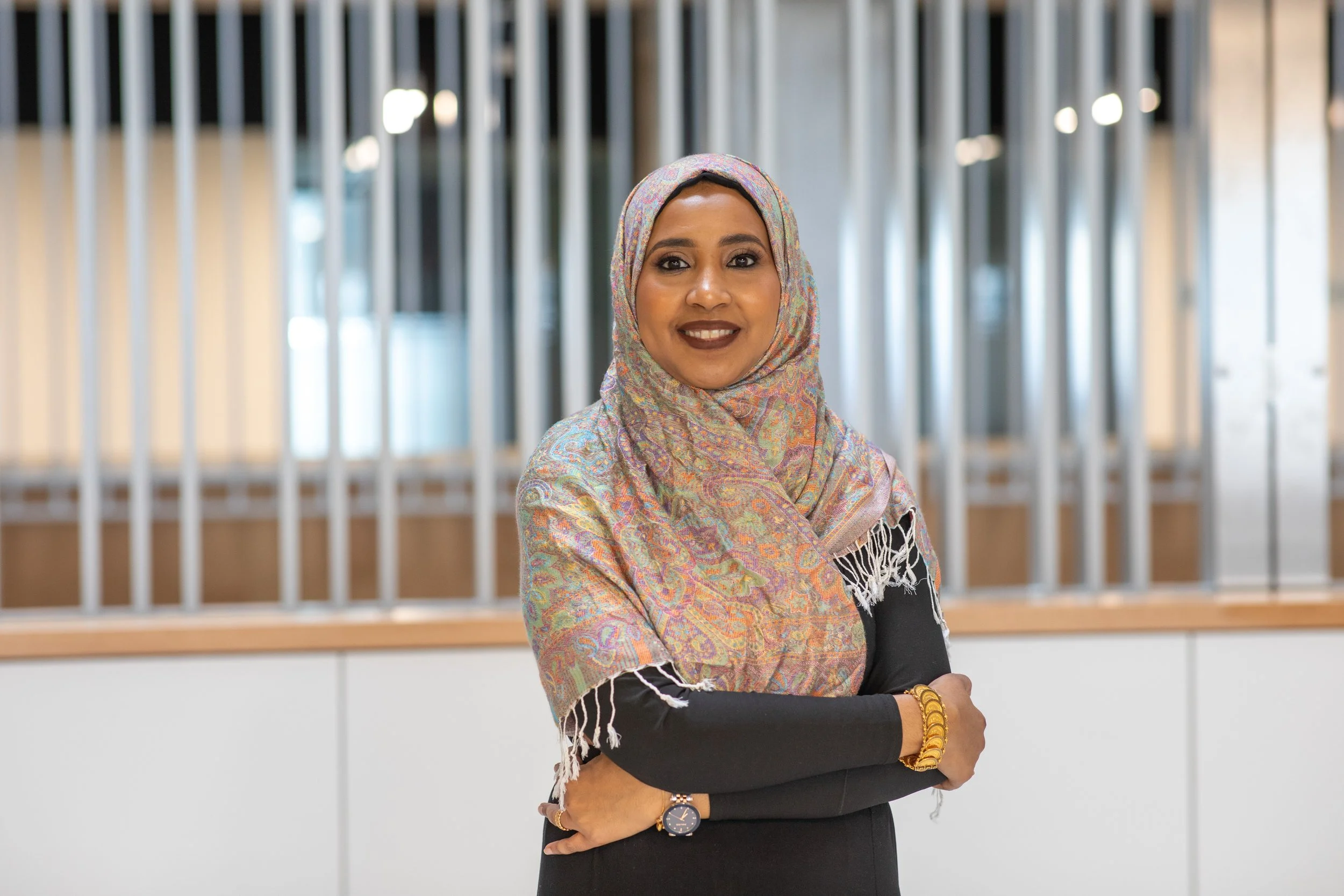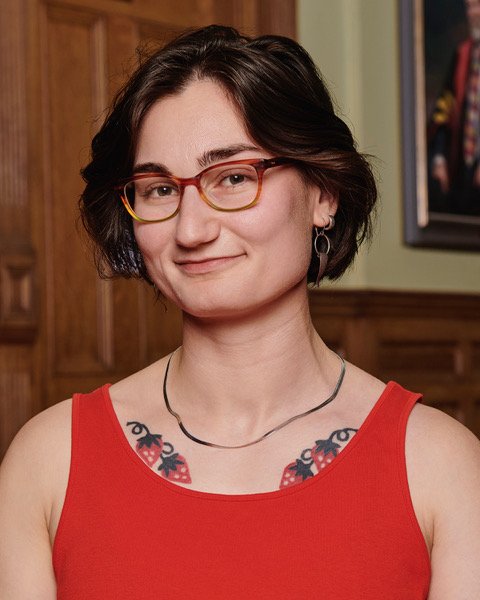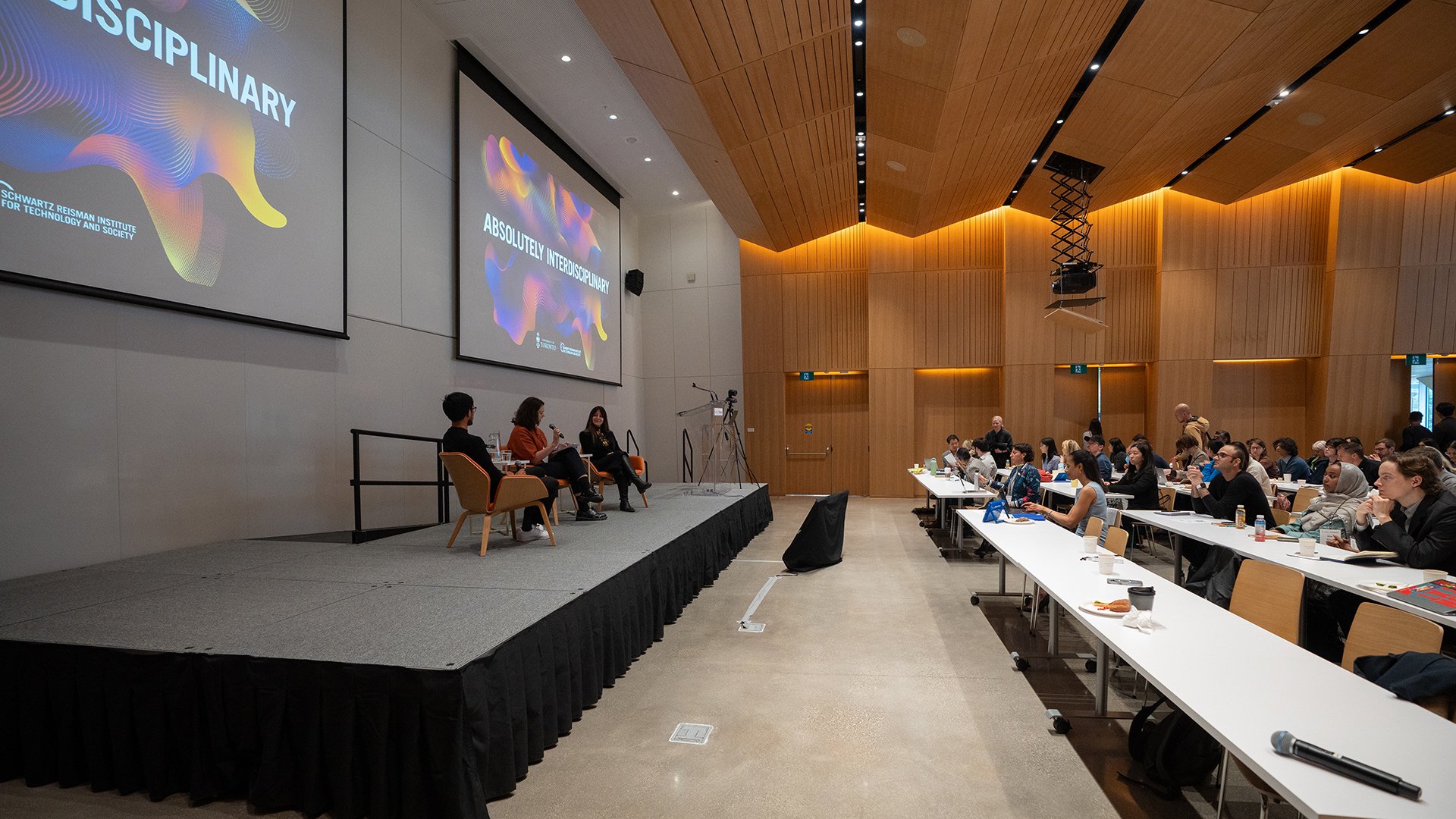Schwartz Reisman Institute announces 2025–26 graduate fellows
The Schwartz Reisman Institute for Technology and Society is proud to announce the appointment of fifteen new graduate fellows from across the University of Toronto. SRI fellowships support interdisciplinary research projects that build new approaches to examine the complex relations between technology and society.
The Schwartz Reisman Institute for Technology and Society (SRI) is proud to announce the recipients of its 2025 call for graduate fellowships. Fifteen outstanding doctoral students from across the University of Toronto have been named Schwartz Reisman Institute fellows, joining SRI’s interdisciplinary community dedicated to ensuring that advanced technologies benefit all of society.
The new cohort brings expertise spanning computer science, engineering, philosophy, public health, information studies, communication, and science and technology studies. Their diverse research interests will enrich SRI’s collaborative environment and support the development of human-centered approaches to the governance of advanced technologies.
SRI fellowships support interdisciplinary research that explores the complex relationships between technology and society—bridging academic fields, advancing critical understanding, and fostering innovative applications for the public good.
The 2025–26 Schwartz Reisman Institute graduate fellows are:
Mai Ali, PhD candidate, Edward S. Rogers Department of Electrical and Computer Engineering
Benjamin Cookson, PhD student, Department of Computer Science
Michael Cooper, PhD candidate, Department of Computer Science
Congyu (Emmy) Fang, PhD student, Department of Computer Science
Mathew Iantorno, PhD candidate, Faculty of Information
Rachel Katz, PhD candidate, Institute for the History and Philosophy of Science & Technology
Kexin (Cassie) Li, PhD student, Edward S. Rogers Department of Electrical and Computer Engineering
Nanyu Luo, PhD student, Department of Applied Psychology & Human Development
Kaushar Mahetaji, PhD student, Faculty of Information
David-Dan Nguyen, PhD student, Institute of Health Policy, Management & Evaluation
Adebukola (Bukky) Shonibare, PhD student, Centre for Criminology and Sociolegal Studies
Priyanka Verma, PhD student, Faculty of Information
Darsana Vijay, PhD candidate, Faculty of Information
Suhyeon Yoo, PhD candidate, Department of Computer Science
Lunjun Zhang, PhD candidate, Department of Computer Science
Get to know SRI’s new graduate fellows
Mai Ali is a PhD candidate in the Edward S. Rogers Department of Electrical and Computer Engineering, where she is a member of the Kundur Research Group. Ali’s research focuses on developing multitask machine learning models to improve the prediction and understanding of mental health comorbidities in youth. By integrating multimodal data—from wearable sensors and ecological assessments to speech and video-based biomarkers—Ali’s work aims to enable early detection and personalized intervention. She is also committed to advancing fairness in AI, with a focus on mitigating bias in mental health technologies and improving outcomes for marginalized populations. Ali is the founding president of the NSBE Graduate Chapter at U of T and the founder of Research Connect, an initiative that creates research opportunities and mentorship for Black undergraduate engineering students. She is a recipient of the IBET Momentum Fellowship and IBET Connect Award.
Benjamin Cookson is a PhD student in the Computer Science Theory Group in the Department of Computer Science, where he is supervised by SRI Research Lead Nisarg Shah and Allan Borodin. His research lies at the intersection of algorithmic economics, social choice theory, and algorithmic fairness. Cookson studies how to formalize fairness in collective decision-making and develops methods to identify fair outcomes when individual preferences differ. His work has applications in voting systems, resource allocation, and the design of fair and accountable AI systems.
Michael Cooper is a PhD candidate in the Department of Computer Science, where he is supervised by SRI Faculty Affiliate Rahul G. Krishnan and Michael Brudno. Cooper's research focuses on applying machine learning in high-stakes clinical settings, with current work aimed at improving equitable waitlist outcomes for liver transplants. He also develops algorithmic techniques to enhance the reliability and interpretability of machine learning systems. Cooper is a recipient of the CIHR Health System Impact Fellowship, and research has been published in leading venues such as NeurIPS, ICML, MLHC, and UAI.
Congyu (Emmy) Fang is a PhD student in the Department of Computer Science at the University of Toronto, where she works at WangLab and CleverHans Lab under the supervision of SRI Faculty Affiliates Bo Wang and Nicolas Papernot. Her research focuses on the intersection of computer security and machine learning, with applications in healthcare and biology. Fang develops privacy-preserving and collaborative machine learning techniques that enable researchers to leverage diverse datasets to build better models while maintaining the confidentiality and privacy of data, with the goal of fostering more accessible and affordable healthcare services.
Mathew Iantorno is a PhD candidate in the Faculty of Information at the University of Toronto, supervised by Julie Chen. His research explores how retail automation—from automats to AI—transforms labour practices, consumer responsibility, and public space. Iantorno’s work draws on digital humanities, media archaeology, field work, and urban studies to investigate the public impact of self-service technologies, with a particular focus on supermarkets and hostile design. Iantorno's awards include a 2024–25 Connaught PhDs for Public Impact Fellowship.
Rachel Katz is a PhD candidate at the Institute for the History and Philosophy of Science & Technology, where she is supervised by SRI Research Lead Karina Vold and is a member of Periscope Lab. Her research explores the intersection of moral philosophy, philosophy of psychiatry, and bioethics, with her doctoral research focused on how the use of AI tools in psychotherapy will transform the patient-therapist relationship. In addition to her research, Katz is passionate about undergraduate education and has developed an interdisciplinary course that brings together Arts & Science and Engineering Science students to explore ethical issues in technology.
Kexin (Cassie) Li is a PhD student in the Edward S. Rogers Department of Electrical and Computer Engineering supervised by SRI Director David Lie. Her research focuses on AI security and privacy, with an emphasis on safeguarding machine learning systems and exploring trustworthy AI. Her doctoral research focuses on developing machine unlearning techniques for large language models to uphold compliance with the EU General Data Protection Regulation’s right to be forgotten, ensuring that AI systems can effectively remove specific data while maintaining functionality. By bridging the gap between regulation and technology, her work seeks to enhance privacy in sensitive domains such as homeless care systems and personalized healthcare, where responsible deployment is critical.
Nanyu Luo is a PhD student in the Department of Applied Psychology & Human Development, where he conducts research under the supervision of Feng Ji in the Psychometrics and Responsible AI Lab. Luo uses deep learning, probabilistic modeling, and federated learning to augment classical psychometric frameworks, facilitating more exact and scalable assessments of mental health constructs and student academic performance. He is developing a framework to evaluate artificial general intelligence based on human-aligned values like fairness and empathy, using psychometric principles to assess AI strengths and limitations. Luo collaborates with psychologists, data scientists, and public health experts to apply his methods in real-world contexts, including early detection of mental health concerns and at-risk students.
Kaushar Mahetaji is a PhD student at the Faculty of Information, supervised by SRI Faculty Affiliate David Nieborg. Her research examines the governance of software tools by platform companies, drawing on critical political economy, information systems, and strategic management frameworks. Her doctoral work investigates the geopolitical boundaries of open-source large language models, exploring regional characteristics and infrastructural dependencies that shape the development, application, and regulation of AI tools.
David-Dan Nguyen is a urology resident physician and PhD student in the Surgeon-Scientist Training Program and Clinician-Investigator Program at the Institute of Health Policy, Management & Evaluation. A CIHR Vanier Scholar, Nguyen uses population-based machine learning methods to develop equitable health policies for prostate cancer patients. Guided by a wide range of stakeholders, his research assesses the cost-effectiveness and equity implications of implementing algorithm-guided screening methods compared to traditional approaches, aiming to inform equitable, data-driven policies that improve efficiency while reducing disparities and overdiagnosis. Nguyen holds a medical degree from McGill University and a Master’s from the Harvard T.H. Chan School of Public Health. He is supervised by SRI Faculty Affiliate Laura Rosella and Dr. Girish Kulkarni.
Adebukola (Bukky) Shonibare is a PhD student in the Centre for Criminology and Sociolegal Studies, supervised by Kelly Hannah-Moffat and Kamari Maxine Clarke. With a first-class degree in law and several advanced degrees—including an MSc in International Human Rights Law from the University of Oxford, and an LLM from the University of Nottingham—as well as extensive practical experience, Shonibare explores how societal dynamics shape the implementation and lived experiences of laws, with a focus on gender inequality, advocacy for survivors of sexual violence, and data-informed policy reforms. In her doctoral research, Shonibare is developing an AI-powered tool for sexual assault survivors designed to securely document testimonies and link them to relevant legal provisions and precedents. As the founder of Invictus Africa, Shonibare has initiated and led projects promoting gender equality and human rights. Her impactful contributions have earned prestigious recognitions, including selection as an Ashoka Fellow, a Ford Global Fellow, a Mandela Washington Fellow by the U.S. Department of State, and an Education Champion by the Malala Fund.
Priyanka Verma is a PhD student at the Faculty of Information, supervised by Samar Sabie, who specializes in computer science, algorithmic fairness, and the design of financial technologies. Her research focuses on developing data tools and algorithmic systems to support underserved communities, including cooperatives and non-profits, addressing issues such as housing justice and financial inclusion. Her research on the data practices of housing cooperatives was recently published at ACM CHI 2025, the top conference in human-computer interaction.
Darsana Vijay is a PhD candidate at the Faculty of Information, specializing in critical media studies, journalism, platform studies, and South Asian studies. With a Master's in media studies from the University of Amsterdam and an Integrated MA in English Studies from IIT Madras, Vijay explores how Indian entrepreneurs, civic tech organizations, journalists, and fact-checkers counter misinformation. Her work on platform-based gig work, alternative journalism in India, and political participation on TikTok has been published in top-tier journals, including Environment and Planning A, Sur Le Journalisme, International Journal of Communication, and American Behavioral Scientist. She is supervised by Nicole S. Cohen.
Suhyeon Yoo is a PhD candidate in Computer Science at the University of Toronto, conducting research at the Dynamic Graphics Project Lab under Khai N. Truong. Her work focuses on human-computer interaction, accessibility, and creativity support, particularly for d/Deaf and hard-of-hearing communities. Yoo’s projects include ELMI (Explore Lyrics and Music Interactively), a web-based AI tool developed during her internship at NAVER AI Lab that helps translate lyrics into sign language for song-signing performances, incorporating large language models, line-by-line gloss editing, and emotionally aware performance guidance. She also developed FAME (Facial Avatar for Musical Expression), a system that visually conveys musical elements through avatars. Yoo also leads research on the role of self-disclosure in cultural content acceptance, the customization of captioning systems, and the use of large language models for behaviour change and mindfulness interventions.
Lunjun Zhang is a PhD candidate in the Machine Learning Group at the University of Toronto, supervised by Jimmy Ba. His research focuses on the intersection of recursive self-improvement and AI alignment, with a particular emphasis on how language models can safely enhance their agentic capabilities while remaining aligned with human values. Zhang holds a bachelor's degree in Engineering Science from the University of Toronto and has previously worked on AI research at organizations such as Google DeepMind, Waabi, Uber, and Mila.























